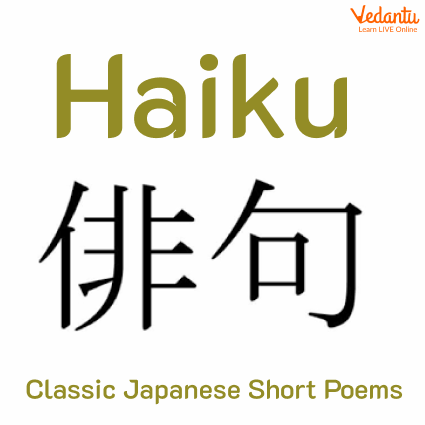We’ve all read poems and recited them. But have you heard of poems that are only 3 lines? Yes! They do exist. And they are called Haikus. Haikus are amazing poetic ways to express your feelings or thoughts in very few words. You might wonder why such poems are even necessary when we can write out thoughts in length and in as many words as we like. So, let us get straight into the concept of Haiku and read out a few amazing examples to look into the significance of this style of writing poetry.
What are Haikus?
Haikus are concise pieces of poetry that are made up of just 3 lines and 17 syllables. Originating in Japan, they are great for expressing bulky emotions and thoughts using very few words. It might seem unbelievable, but Haikus really do have this capability to convey very elaborate content in a short space. Not ready to accept this fact yet? Wait till you read a few amazing pieces of Haiku from the following list!

Haiku - Classic Japanese Short Poems
List of Haiku Poems for Kids
1. A Morning
Bees nudged the flowers
Babies peeped out of the nest
One fine crisp morning.
— Arun Bahadur Gurung
This poem celebrates life on Earth and the beauty of motion in the lap of nature. It expresses the innocence and playfulness of delicate beings and how they interact with mother Earth.
2. Heaven’s Photoshoot
When I see lightning,
I like to think that the sky
captures earth’s beauty
— Imteyaz
It is a poem about the majestic beauty of nature and the diversity it beholds. It’s almost like you can capture nature in a frame every time in a different, wonderous frame.
3. Family Love is
Like the sun rises
Each morning and sets each night,
Family love is.
— Michele Meleen
This is a poem about the consistent care and support we get from and give to our family. Just like the rising of the Sun and the setting of night, this care never fades.
4. Fishing with Grandpa
I feel it tugging
Hanging on – It must be huge!
Bluegill, smiles, grandpa
— Shawn Sackman
In this poem, the poet reminisces about the merry times spent with their grandpa.
5. Spring’s Arrival
Trees wear floral wreaths
and birds sing the welcoming
melody of spring.
— Imteyaz
It is a poem celebrating the coming of Spring and its freshness.
6. Autumn’s Masterpiece
Have you seen that red,
golden leaves paint the ground
like a sunset sky.
— Imteyaz
This poem glorifies the Autumn season with literary ornamentation.
7. Joy of Spring
Spring is in the air
Flowers are blooming sky high
Children are laughing.
— Kaitlyn Guenther
This is another poem about the Spring season, describing Spring against flowers and children.
8. Family Love, Nature’s Harmony
A family love
makes the world sing out with joy.
Nature’s harmony.
— Michele Meleen
This poem compares the love of family to nature’s harmony, which is a huge, complex, and beautiful thing in itself.
9. Love of Family
Ecosystems thrive
working together just like
love of family.
— Michele Meleen
This is another poem about the family where the poet compares the functioning of the family’s support to the thriving of elaborate ecosystems, working in unison with nature.
10. German Shepherds
Beyond fence lurking,
Frightening bark from within,
Jump I, from my skin!
This is a descriptive poem about the dog breed German Shepherd. They are scary and large breeds of dogs and have the potential to frighten the toughest of humans.
Conclusion
All the above Haikus work on themes that are elaborate and complex in nature, but these little poems address the matters sufficiently in-depth to be able to bring out the actual essence of the idea that is being put forth to the audience.


FAQs on 10 Famous Haiku Poems for Kids
1. Where did the form Haiku originate?
The poetic form Haiku originated in Japan. The term ‘haiku’ was derived from the word ‘hokku’, which means the opening three lines of a longer poem called a ‘tanka’.
2. Which format does the Haiku follow?
The Haiku comprises 3 lines with 5 syllables in the first line, 7 syllables in the second line, and 5 syllables in the third line. The Haiku has a total of 17 syllables.





